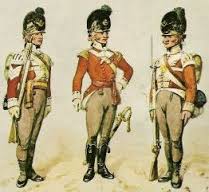Annotation:Perthshire Volunteers: Difference between revisions
No edit summary |
No edit summary |
||
| Line 5: | Line 5: | ||
<br> | <br> | ||
<br> | <br> | ||
[[File:perthshirevolunteers.jpg| | [[File:perthshirevolunteers.jpg|300px|thumb|left|Perthshire Volunteers, c. 1801]] | ||
The Perthshire Volunteers were the 90th Light Infantry Regiment, who later became the second battalion of the Cameronians (Scottish Rifles). The regiment was raised in 1794 by Mr. Thomas Graham, Laird of Balgowan, afterwards Lord Lynedoch, on his return from the siege Toulon where he had gone as a volunteer. The King gave permission only reluctantly to Graham, who despite his volunteering had very little military experience, but Graham received advice and assistance from Lord Moira, who had much military experience in the American wars. The uniform consisted of the regular red coat, faced with buff, although the men wore light grey cloth pantaloons, leading to the corps being dubbed the “Perthshire Grey-Breeks.” The regiment served with distinction in Egypt at the beginning of the 19th century, then in Ireland and the East Indies during most of the Napoleonic period. Source for notated version: | The Perthshire Volunteers were the 90th Light Infantry Regiment, who later became the second battalion of the Cameronians (Scottish Rifles). The regiment was raised in 1794 by Mr. Thomas Graham, Laird of Balgowan, afterwards Lord Lynedoch, on his return from the siege Toulon where he had gone as a volunteer. The King gave permission only reluctantly to Graham, who despite his volunteering had very little military experience, but Graham received advice and assistance from Lord Moira, who had much military experience in the American wars. The uniform consisted of the regular red coat, faced with buff, although the men wore light grey cloth pantaloons, leading to the corps being dubbed the “Perthshire Grey-Breeks.” The regiment served with distinction in Egypt at the beginning of the 19th century, then in Ireland and the East Indies during most of the Napoleonic period. Source for notated version: | ||
<br> | <br> | ||
| Line 16: | Line 16: | ||
</font></p> | </font></p> | ||
<p><font face="garamond, serif" size="4"> | <p><font face="garamond, serif" size="4"> | ||
''Printed sources'': Carlin ('''The Gow Collection'''), 1989; No. 204. Glen ('''The Glen Collection of Scottish Music, vol. 2'''), 1895; p. 6. Gow ('''Fourth Collection of Niel Gow’s Reels)''', 2nd ed., originally 1800; p. 28. Kerr ('''Merry Melodies, vol. 3'''), c. 1880’s; No. 198, p. 23. MacDonald ('''The Skye Collection'''), 1887; p. 16. Moffat ('''Dance Music of the North'''), 1908; No. 30, p. 13. Petrie ('''A Fourth Collection of Strathspeys, Reels, Jiggs and Country Dances'''), c. 1805. Skinner ('''Harp and Claymore'''), 1904; p. 91. Stewart-Robertson ('''The Athole Collection'''), 1884; p. 4. | ''Printed sources'': Carlin ('''The Gow Collection'''), 1989; No. 204. Glen ('''The Glen Collection of Scottish Music, vol. 2'''), 1895; p. 6. Gow ('''Fourth Collection of Niel Gow’s Reels)''', 2nd ed., originally 1800; p. 28. Kerr ('''Merry Melodies, vol. 3'''), c. 1880’s; No. 198, p. 23. J. Kenyon Lees ('''Balmoral Reel Book'''), Glasgow, 1910; p. 8. MacDonald ('''The Skye Collection'''), 1887; p. 16. Moffat ('''Dance Music of the North'''), 1908; No. 30, p. 13. Petrie ('''A Fourth Collection of Strathspeys, Reels, Jiggs and Country Dances'''), c. 1805. Skinner ('''Harp and Claymore'''), 1904; p. 91. Stewart-Robertson ('''The Athole Collection'''), 1884; p. 4. | ||
<br> | <br> | ||
<br> | <br> | ||
Revision as of 14:10, 17 June 2016
Back to Perthshire Volunteers
PERTHSHIRE VOLUNTEERS. Scottish, Strathspey or Highland Schottische. A Major. Standard tuning (fiddle). AB (Kerr): AAB (most versions). According to Keith MacDonald's Skye Collection (1887) the melody was composed by one "Miss Sterling" (biography:Miss Stirling of Ardoch, of Braco, Perthshire, who also composed "Perthshire Hunt"). All other volumes omit composer credit, including Gow (1800).

The Perthshire Volunteers were the 90th Light Infantry Regiment, who later became the second battalion of the Cameronians (Scottish Rifles). The regiment was raised in 1794 by Mr. Thomas Graham, Laird of Balgowan, afterwards Lord Lynedoch, on his return from the siege Toulon where he had gone as a volunteer. The King gave permission only reluctantly to Graham, who despite his volunteering had very little military experience, but Graham received advice and assistance from Lord Moira, who had much military experience in the American wars. The uniform consisted of the regular red coat, faced with buff, although the men wore light grey cloth pantaloons, leading to the corps being dubbed the “Perthshire Grey-Breeks.” The regiment served with distinction in Egypt at the beginning of the 19th century, then in Ireland and the East Indies during most of the Napoleonic period. Source for notated version:
Source for notated version: “As played by Alex. F. Skinner,” who was fiddler-composer J. Scott Skinner's older brother, and a powerful violinist in his own right [Skinner].
Printed sources: Carlin (The Gow Collection), 1989; No. 204. Glen (The Glen Collection of Scottish Music, vol. 2), 1895; p. 6. Gow (Fourth Collection of Niel Gow’s Reels), 2nd ed., originally 1800; p. 28. Kerr (Merry Melodies, vol. 3), c. 1880’s; No. 198, p. 23. J. Kenyon Lees (Balmoral Reel Book), Glasgow, 1910; p. 8. MacDonald (The Skye Collection), 1887; p. 16. Moffat (Dance Music of the North), 1908; No. 30, p. 13. Petrie (A Fourth Collection of Strathspeys, Reels, Jiggs and Country Dances), c. 1805. Skinner (Harp and Claymore), 1904; p. 91. Stewart-Robertson (The Athole Collection), 1884; p. 4.
Recorded sources: Beltona BL2096 (78 RPM), Edinburgh Highland Reel and Strathspey Society (1936).
See also listing at:
Alan Snyder’s Cape Breton Fiddle Recording Index [1]
